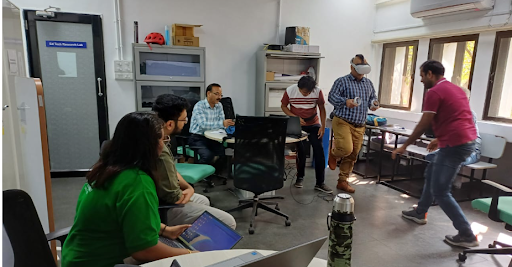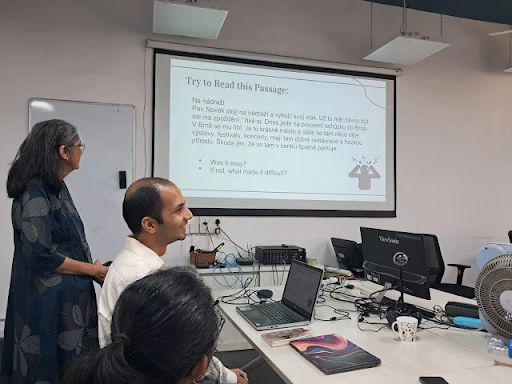Learning log: SCERT Uttarakhand Orientation Program at IIT Bombay
13th - 17th January 2025 | Venue: EdTech Research Lab, IIT Bombay
Day 1: Foundational Insights and Technology Demonstrations
The program began with a formal inaugural session led by Prof. Sahana Murthy and Prof Dr. Ramkumar Rajendran. The SCERT Uttarakhand team, including Assistant Director Dr. K.N. Bijalwan, Program Coordinator Ramesh Badoni, Faculties Rakesh Rawat, and Akhilesh Dobhal, participated actively.
Introduction to AI and ML:
- Dr. Ramkumar Rajendran explained linear regression and its applications in personalized learning and data-driven decision-making and explained the basics of ML
- Platform Demonstrations:
- SAFE (Secure Assessment for Everyone): A platform for secure and scalable online assessments.
- BodhiTree: A flipped classroom tool promoting interactive and personalized learning. where BodhiTree hosts interactive multimedia books including lab manuals that mimic classroom teaching. Books are made of chapters which in turn are composed of interactive videos
- Augmented Reality (AR): Demonstrated for teaching complex biology concepts in an immersive manner.
- Python-based LMS: Showcased for creating interactive, data-driven educational content.
Faculties appreciated the BodhiTree LMS and lecture on Linear regression in ML and its potential to transform traditional teaching methods.
Day 2: Literacy Tools and Machine Learning Applications
- Presented by Mr. Nagesh Nayak, Dr. Sneha Raman, and Prof. Preeti Rao, TARA showcased its ability to assess oral reading fluency in real time, aligning with NIPUN Bharat guidelines.
- SCERT participants, including Dr. K.N. Bijalwan, Mr. Akhilesh Dobhal, and Mr. Ramesh Badoni, highlighted TARA's potential for Uttarakhand classrooms and suggested adaptations for state-specific needs. Dr Bijalwan showed keen interest in TARA implementation along with NIPUN in Uttarakhand.
It was a really amazing session on Machine Learning concepts led by Prof. Ramkumar explored the integration of AI into lesson plans and evaluation tools.
Day 3: Natural Language Processing and Educational Content Creation
Day three combined theoretical insights with practical exposure to AI tools.
- Natural Language Processing (NLP):
- Prof. Ramkumar Rajendran explained word embeddings, generative models, and large language models like BERT.
- Real-world applications of NLP in educational tools, such as epsilon up and CoreNLP, were introduced.
- Eye-Tracking Technology:
- Demonstrated by Tushar and Debarshi to assess student attention and cognitive behavior in classrooms.
- Visit NPTEL Studio:
- Ms. Bharati and her team guided the SCERT team through content creation and recording techniques.
- Dr. K.N. Bijalwan recorded a promotional video for an upcoming Hackathon in Uttarakhand.
Day 4: Collaborative Learning and Open Educational Resources (OER)
The sessions on the fourth day highlighted tools and practices to promote inclusivity and quality education.
- PPCCLT CLRL- Collaborative Learning Platforms:
- Prof. Ramkumar demonstrated platforms fostering teamwork and inclusivity at PPCCLT CLRL and asked for hands-on peer instruction, sharing, and collaborating on a task.
- Ms. Priti Ingle led an interactive session on designing and leveraging collaborative platforms.
- EdTech Tulna:
- A tool for evaluating EdTech products, introduced by Angelina Philip and Sheeja Vasudevan.
- SCERT participants, including Rakesh Rawat and Akhilesh Dobhal, discussed its relevance for Uttarakhand’s education ecosystem.
- Spoken Tutorials:
- A hands-on session by Dr. Snehalatha showcased the use of Open Educational Resources (OER) for self-paced learning.
Day 5: AI Innovations and Virtual Reality in Education
On Day 5, Prof. Ramkumar initiated the session with an insightful introduction to Large Language Models (LLMs), explaining their fundamental concepts, capabilities, and relevance in the field of education. He elaborated on how these AI-driven tools can enhance learning and teaching by providing context-aware assistance and generating creative, personalized content. Prof. Ramkumar also emphasized the importance of crafting effective prompts to maximize the potential of LLMs, illustrating this with practical examples. The session fostered a lively interaction with SCERT faculties, who engaged in discussions about integrating LLMs into their pedagogical practices to enhance educational outcomes and support the evolving needs of students.
The final day showcased futuristic tools designed to revolutionize education:
- ThoughtBotAI: Demonstrated as a personalized learning assistant for students and teachers. It was presented by Sanchita and Aditya both are PhD scholars.
- Generative AI for Japanese Language Learning: Presented by Aditya, Mayur, Sanchita, Shekhar, Anthony, and Mayur highlighting the creation of visually rich and engaging content in Japanese Language. There was talk about Kanji and the website for these AI-driven images created in Copilot.
- Personalized Bots: AI-driven chatbots for self-paced learning and tailored educational experiences.
- VRLE (Virtual Reality Learning Environment): Anthony Demonstrated immersive and experiential classroom learning. Faculty from SCERT; Rakesh Rawat and Akhilesh Dobhal had experiential learning on a VR set. Another VR IC Engine demonstrated by Samrth and hands-on in the Lab with Dr K N Bijalwan
- Prof Ramkumar interacted and shared his expertise in between to know more about prompts in daily life and handling VR set
- Emerging Technology in School education: Use of a variety of tools and applications based on AI like Auto classmate, Diffit, CuripodAi, AI-generated lesson plans, Chat PDF and many alike demonstrated by Vishwas PhD Scholar at Edtech, IIT Bombay.
Places Visited:
- EdTech Research Lab, IIT Bombay
- IIT Innovation and Design Department
- NPTEL Studio
- PPCCLT CLRL






